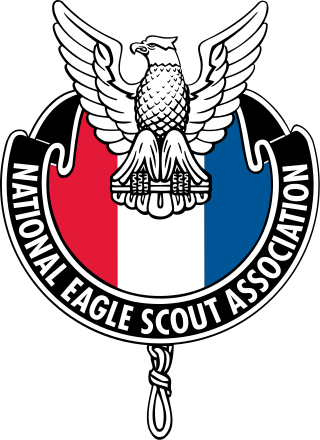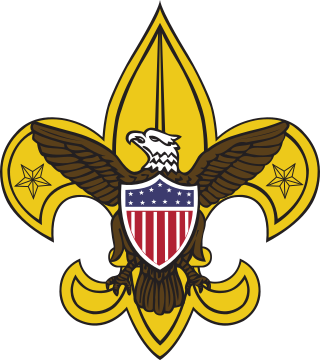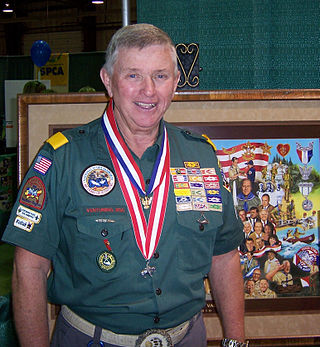
The Boy Scouts of America is one of the largest scouting organizations and one of the largest youth organizations in the United States, with over 1 million youth, including 176,000 female participants. The BSA was founded in 1910; about 130 million Americans have participated in its programs, which are served by 477,000 adult volunteers. BSA became a founding member organization of the World Organization of the Scout Movement in 1922.

Eagle Scout is the highest rank attainable in the Scouts BSA program by the Boy Scouts of America (BSA). Since its inception in 1911, only four percent of Scouts have earned this rank after a lengthy review process. The Eagle Scout rank has been earned by over 2.5 million youth.

Cub Scouting is part of the Scouting program of Scouting America, formerly known as Boy Scouts of America (BSA), available to coeducational children from kindergarten through fifth grade, or 5 to 10 years of age and their families. Its membership is the largest of the five main BSA divisions. Cub Scouting is part of the worldwide Scouting movement and aims to promote character development, citizenship training, personal fitness, and leadership.

A variety of religious emblems programs are used by the Boy Scouts of America (BSA) to encourage youth to learn about their faith and to recognize adults who provide significant service to youth in a religious environment. These religious programs are created, administered and awarded by the various religious groups, not the BSA, but each program must be recognized by the BSA.

Venturing is a core program of the Boy Scouts of America for young men and women ages 14 through 20. It is one of the Boy Scouts' three programs for older youth, which also include Sea Scouts and Exploring. The purpose of Venturing is to provide a positive environment where youth members, called Venturers, can lead the adventure, take on new leadership roles, and mature into responsible adults.

Sea Scouts is a program of the Boy Scouts of America for young men and women ages 14 through 20.

Varsity Scouting was a program of the Boy Scouts of America (BSA). It was an alternative available to boys ages fourteen to eighteen until the end of 2017. It used the basic Boy Scouting program and added high adventure, sporting, and other elements that were more appealing to older youth to accomplish the aims of character development, citizenship training, and personal fitness. Varsity Scouts were organized into teams; separate chartered units from a Boy Scout troop.

The Boy Scouts of America (BSA) use uniforms and insignia to give a Scout visibility and create a level of identity within both the unit and the community. The uniform is used to promote equality while showing individual achievement. While all uniforms are similar in basic design, they do vary in color and detail to identify the different membership divisions of Cub Scouting, Scouts BSA, Sea Scouts, and Venturing. Many people collect BSA insignia such as camporee and jamboree emblems, council shoulder strips and historical badges.

The National Eagle Scout Association is an organization of individuals who have earned the rank of Eagle Scout in the Boy Scouts of America. NESA's stated objective is "to serve Eagle Scouts and, through them, the entire movement of Scouting."

Scouts BSA is the flagship program and membership level of the Boy Scouts of America (BSA) for coeducational young people between the ages of typically 11 and 17. It provides youth training in character, citizenship, personal fitness, and leadership, and aims to develop the skills necessary to become successful adults.

Richards Marion "Doc" Miller is a dentist and one of the founders of the Venturing program of the Boy Scouts of America. Miller is the recipient of the Distinguished Eagle Scout Award and Silver Buffalo Award

The Boy Scouts of America (BSA) was inspired by and modeled on The Boy Scouts Association, established by Robert Baden-Powell in Britain in 1908. In the early 1900s, several youth organizations were active, and many became part of the BSA.
The Ranger Award is an award available to youth in the Venturing program of the Boy Scouts of America, to encourage and recognize proficiency in skills.

The advancement program for Scouts participating in the Scouts BSA program of the Boy Scouts of America is symbolized by the earning of seven ranks. The advancement program is often considered to be divided into two phases. The first phase from joining to First Class is designed to teach the scout Scoutcraft skills, how to participate in a group and to learn self-reliance. The Scout badge is awarded when the Scout demonstrates a rudimentary knowledge of the Scouting ideals and program. Tenderfoot, Second Class, and First Class have progressively harder requirements in the areas of Scoutcraft, physical fitness, citizenship, personal growth and Scout Spirit.
The BSA Distinguished Conservation Service Award Program is a series of awards presented by the Boy Scouts of America (BSA) for service in conservation and ecology. Created by William Temple Hornaday as the Permanent Wild Life Protection Fund Medal in 1915, the program is designed to encourage learning about natural resource conservation and the environment, teach sound stewardship of the natural resources and the environment, and recognize those who are outstanding in this field. After Hornaday's death in 1937, the program was renamed in his honor to the William T. Hornaday Awards in 1938 and officially became a BSA award program. In October 2020, after a review of Hornaday's life, the BSA changed the name of and significantly modified the program, stating that some of Hornaday's beliefs went "against the BSA’s values," and determined that "the conservation award should no longer bear his name in order to uphold our commitment against racism and discrimination."
Leadership training in the Boy Scouts of America includes training on how to administer the Scouting program, outdoor skills training for adults and youth, and leadership development courses for adults and youth. Some of these courses like Youth Protection Training are mandatory. Most of the courses are offered by the local council, while a few are hosted at the national level, currently at Philmont Training Center in New Mexico. They are available to members of all of the Boy Scout programs, including Cub Scouts, Boy Scouts, Explorer Posts, and Venturing Crews.
The Scouter's Training Award is an adult recognition of the Boy Scouts of America. This award is available across several different program areas and can be earned more than once.
The Scouter's Key Award is an adult recognition of the Boy Scouts of America. This award is available across several different program areas and can be earned more than once.

The Venturing Summit is the highest rank for youth in the Venturing program of the Boy Scouts of America. It requires Venturers to earn the Pathfinder Rank, participate in adventures, and demonstrate leadership, service and personal growth.

In the Boy Scouts of America, a Scout leader refers to the trained leaders of a Scout unit. Adult leaders are generally referred to as "Scouters," and the youth leaders are referred to by their position within a unit. In all Scouting units above the Cub Scout pack and units serving adolescent Scouts, leadership of the unit comprises both adult leaders (Scouters) and youth leaders (Scouts). This is a key part of the Aims and Methods of Scouting. In order to learn leadership, the youth must actually serve in leadership roles.














